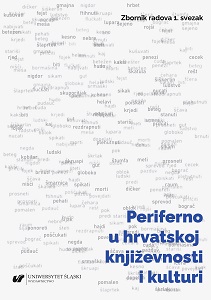Odnos središta i periferije u oblikovanju književnoga kanona: hrvatsko-poljski književnopovijesni primjeri
The Relationship between Centre and Periphery in Shaping Literary Canon: Croatian-Polish Literary-Historical Examples
Author(s): Tea Rogić Musa
Subject(s): Cultural history, Comparative Study of Literature, Croatian Literature, Polish Literature, Culture and social structure
Published by: Wydawnictwo Uniwersytetu Śląskiego
Keywords: literary canon; Romanticism; Moderna Period
Summary/Abstract: Using the examples from Romanticism and Moderna period, this paper will examine the opposition centre-periphery regarding the role of the ideology of pan-Slavic reciprocity in the field of Polish-Croatian literary ties. Next, we will describe the process of attribution within literary and cultural history in which a series of so-called great authors have arisen, and to which their communities (Polish and Croatian) attribute central aesthetic and ideological roles. Further, starting from the assumption that the Polish and Croatian cultural communities used their literary canon to legitimise their own artistic and social inclinations, we shall attempt to determine the universalistic characteristics that allowed the Polish literary canon to become a desirable alternative and a source of homogenizing poetics that enabled the aesthetic synchrony of Croatian literature with a European paradigm in two literary periods – Romanticism and its younger relative, Moderna.
Book: Periferno u hrvatskoj književnosti i kulturi / Peryferie w chorwackiej literaturze i kulturze
- Page Range: 505-519
- Page Count: 15
- Publication Year: 2021
- Language: Croatian
- Content File-PDF

